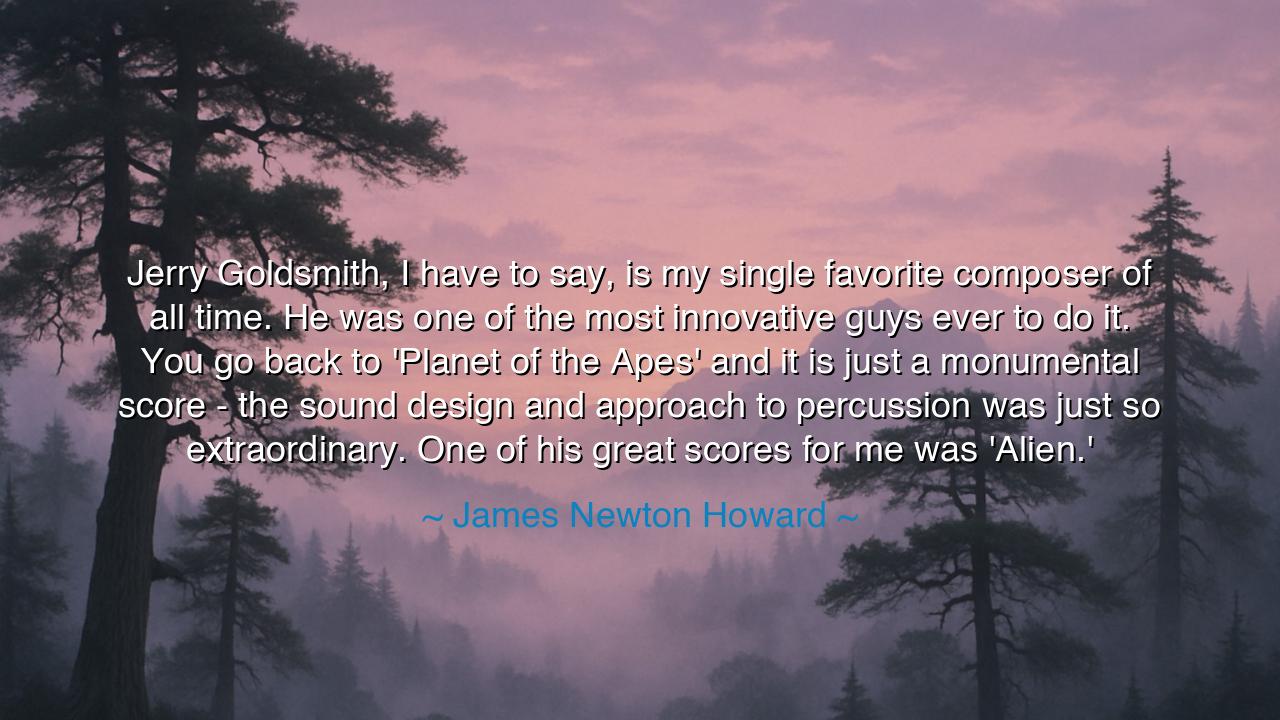
Jerry Goldsmith, I have to say, is my single favorite composer of
Jerry Goldsmith, I have to say, is my single favorite composer of all time. He was one of the most innovative guys ever to do it. You go back to 'Planet of the Apes' and it is just a monumental score - the sound design and approach to percussion was just so extraordinary. One of his great scores for me was 'Alien.'






When James Newton Howard declared, “Jerry Goldsmith, I have to say, is my single favorite composer of all time. He was one of the most innovative guys ever to do it. You go back to 'Planet of the Apes' and it is just a monumental score - the sound design and approach to percussion was just so extraordinary. One of his great scores for me was 'Alien,’” he spoke not merely of admiration, but of reverence for a master of musical storytelling. His words reveal that the power of composition lies not only in melody, but in the imagination, innovation, and courage to explore new sonic realms. Goldsmith’s work transcends mere accompaniment; it is a conduit for emotion, tension, and the ineffable qualities of cinematic experience.
The origin of this reflection lies in Howard’s own career as a composer for film, a path in which Goldsmith’s pioneering work has been both inspiration and guide. Goldsmith, whose career spanned decades, was renowned for experimenting with percussion, electronic sounds, and unconventional orchestration, creating scores that were both emotionally resonant and technically groundbreaking. By citing Planet of the Apes and Alien, Howard emphasizes the transformative power of Goldsmith’s compositions: they were not simply music, but worlds unto themselves, shaping the audience’s experience and expanding the boundaries of cinematic storytelling.
Goldsmith’s artistry resonates with the wisdom of the ancients, who understood music as more than entertainment — as a force that shapes the mind and spirit. The Greeks believed that music could temper emotion, inspire courage, and align the soul with cosmic harmony. Howard’s reflection suggests that Goldsmith’s compositions perform a similar function in the modern age: they channel human emotion, amplify narrative, and awaken deep psychological resonance. The percussion in Planet of the Apes, for instance, does not merely mark rhythm; it evokes primal tension, fear, and awe, connecting the audience to the innate, universal pulse of storytelling.
Consider the story of Goldsmith’s score for Alien. In that film, he used dissonance, electronics, and unconventional instrumentation to evoke dread and suspense, creating a soundscape that became inseparable from the terror on screen. The score does not simply accompany the narrative; it guides the audience’s emotions, enhances the visual storytelling, and transforms fear into a tangible, almost physical experience. Howard recognizes that this is the hallmark of a truly innovative composer: one who does not follow formula, but crafts new languages of sound that resonate across time and medium.
The meaning of Howard’s words extends beyond film music; it speaks to the power of innovation and mastery in any field. Goldsmith’s genius lay in his willingness to experiment, to push beyond traditional forms, and to embrace risk in the service of expression. His work teaches that true artistry emerges from curiosity, courage, and relentless pursuit of originality. By studying the past and daring to innovate, creators in any discipline can leave a legacy that transforms the way others perceive, feel, and understand their work.
Howard’s reflection also emphasizes the importance of influence and mentorship. Goldsmith’s impact on generations of composers is not simply technical but inspirational. Those who follow in his footsteps are reminded that excellence involves both discipline and imagination, both reverence for tradition and willingness to break from it. Like the philosophers of old, who passed wisdom through dialogue and example, Goldsmith’s scores act as lessons in creativity, innovation, and the power of emotional resonance.
O listener, take this teaching into your own craft: study the masters, observe their innovations, and allow their courage to inspire your own explorations. Whether you work in music, art, literature, or any field of creation, understand that true innovation requires attentiveness, experimentation, and the boldness to forge new paths. Goldsmith’s legacy reminds us that the tools of mastery — whether instruments, words, or ideas — become conduits for something larger when wielded with vision and daring.
In the end, James Newton Howard reminds us that the impact of genius is measured not only by skill but by imagination, influence, and daring innovation. Jerry Goldsmith’s compositions endure because they transformed sound into emotion, technique into experience, and music into storytelling that resonates across generations. To honor his example is to embrace creativity without boundaries, to explore boldly, and to recognize that artistry is as much about vision and courage as it is about talent.






AAdministratorAdministrator
Welcome, honored guests. Please leave a comment, we will respond soon